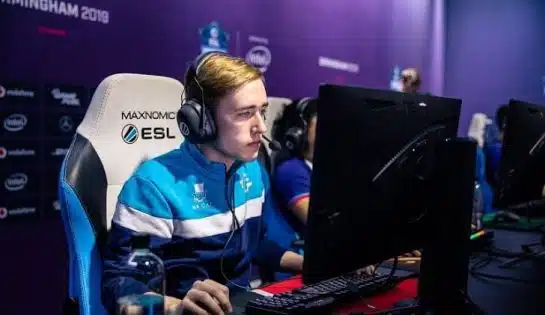
Quinn Sounds the Alarm on New Dota 2 Report System
| Tags: Dota 2
| Author The News One

Gaimin Gladiators ace Quinn “Quinn” Callahan is not a fan of the new Dota 2 report system as he believes it poses a significant threat to high MMR pubs
Dota 2's highly anticipated summer update ushered in a slew of significant alterations to the game's client, which included a complete overhaul of the behavior score system. While these changes were meant to foster a healthier gaming environment, they have inadvertently triggered concerns from Quinn Callahan, a prominent member of the Gaimin Gladiators team.
Quinn's apprehension revolves around the stringent penalties imposed on players exhibiting disruptive behavior, and how these measures might impact the future of high-MMR ranked matches.
In this transformative update, Dota 2 developers sought to address the long-standing issue of player behavior by revamping the behavior score system. This system functions as a crucial mechanism for assessing and curbing undesirable in-game conduct, such as griefing, toxicity, and abandoning matches. The overarching goal was to create a more enjoyable and sportsmanlike environment for all players, irrespective of their skill level.
I guess the new report system will work fine – /u/tavoreimagined https://t.co/AIqxZFPCQL #dota2 pic.twitter.com/cyLb3bOMuA
— Reddit Dota 2 (@redditdota2) September 2, 2023
The unintended consequences of these adjustments, however, have caused Quinn Callahan to voice his concerns. Quinn, a seasoned professional within the Dota 2 competitive scene, is apprehensive about the potential ramifications of the stringent sanctions imposed on misbehaving players. High-MMR (Matchmaking Rating) games, which involve the most skilled and dedicated players in the Dota 2 community, are especially at risk.
What Does Quinn Think About The New Dota 2 Report System?
In a Twitch livestream on September 4th, Quinn engaged in a detailed discussion about the extensive changes recently introduced to Dota 2. The three-time Major winner pointed out a glaring issue with the new Dota 2 report system, arguing that it is currently malfunctioning. His concern primarily centers on the absence of a set threshold, leading to the possibility that a vast majority of high-ranking players may face restrictions from playing ranked matches until they rectify their behavior scores.
The problem at hand is a result of players exploiting the system and Valve's inadvertent oversight, leading to the emergence of Dota's elite players on the list of misbehaving individuals.
“Whenever players are losing games, they report everyone in the entire game,” the midlane maestro said while acknowledging he has started to do the same as well. For this reason, the entire lobby, rather than just the single troublemaker, witnesses a rapid decline in their behavior scores.
While this wasn't a concern in the previous system, Valve's recent changes dictate that any player holding a behavior score of 3,000 or less is ineligible for ranked matchmaking. Quinn is of the opinion that behavior scores for the entire top one percent of Dota players are plummeting.
“[In] every game, everyone is reporting everyone else, and collectively behavior scores are going down,” Quinn argues, claiming that most pros will drop below the minimum behavior score criteria over the next two weeks.
The New Report System Is Bugged and I Got Proof (It is likely that commends are counted as reports) – /u/Middle_Sun_4693 https://t.co/V5ibYyNu4d #dota2 pic.twitter.com/J0NuKAj8Qu
— Reddit Dota 2 (@redditdota2) September 4, 2023
He also made it clear that commending isn't resolving the problem at hand. With behavior summaries being updated every 10 games of Dota, the excessive number of reports each player is subjected to is counteracting any potential benefits from commending.
The absence of a report limit and a lack of deterrents against mass reporting have resulted in widespread abuse of the system.
The 23-year-old proceeded to share his recent reports, revealing that all of them had been reviewed, despite half of them having no basis. The client now provides notifications whenever Valve's system takes action on a report you submit.
“I reported these people for nothing and they all got punished,” he revealed.
Should Valve Scrap The New Dota 2 Report System?
The problem at hand appears to primarily affect players in the upper echelons of the Dota 2 community. The idea of restraining the game's most skilled and dedicated players due to a prevalence of false positive reports is a matter that deserves careful reconsideration on Valve's part.
While acknowledging the concerns raised by Quinn and the professional gaming community, it's essential to consider the flip side of the coin. The act of misusing the reporting system to settle personal scores or engage in punitive actions against others is, in itself, a problematic behavior that detracts from the overall spirit of sportsmanship and fair play.
Players resorting to false reporting, either to undermine their opponents or to exploit the system for their benefit, create an environment of distrust and frustration within the Dota 2 community. Such actions not only erode the integrity of the reporting system but also impede its ability to accurately identify and address genuine misconduct.
The gravity of this situation cannot be overstated, particularly for competitive players who have been dedicating themselves to mastering the game, honing their skills, and competing at the highest level. To be deprived of the opportunity to participate in ranked matches, which serve as the proving grounds for their abilities, so close to the pinnacle of competitive Dota 2, the International, is a disheartening prospect.
A more constructive approach involves addressing grievances in a more measured and thoughtful manner. This could include using the reporting system judiciously, and focusing on genuinely disruptive behavior rather than resorting to indiscriminate reporting. Players must also contribute positively to the community by promoting sportsmanship and teamwork.
